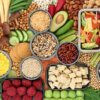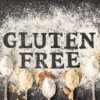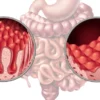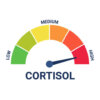
As a gut health practitioner, I often work with clients who follow a gluten-free diet—either due to coeliac disease, non-coeliac gluten sensitivity, or personal choice. While removing gluten is essential for those with coeliac disease, it’s important to be aware that a gluten-free diet can sometimes lead to nutritional gaps if not carefully planned.
In this blog, I’ll explain what a gluten-free diet entails, highlight the common nutrients that may be lacking, and provide practical tips for maintaining a balanced and nutrient-rich diet while avoiding gluten.
What is a Gluten-Free Diet?
A gluten-free diet excludes all foods containing gluten, a protein found in wheat, barley, and rye. This includes foods such as bread, pasta, baked goods, and many processed foods that contain hidden sources of gluten.
For individuals with coeliac disease, a strict gluten-free diet is essential to prevent intestinal damage, reduce inflammation, and improve overall health. Even small amounts of gluten can trigger symptoms and harm the gut lining.
For others, gluten avoidance may be a choice to improve digestion or reduce bloating, but it’s important to plan meals carefully to ensure nutritional adequacy.
Nutritional Concerns on a Gluten-Free Diet
While gluten-free diets can support gut health for those who need them, they can also present challenges when it comes to maintaining balanced nutrition. Many gluten-containing foods are fortified or naturally rich in essential nutrients, and eliminating them can leave gaps in the diet.
Common Nutrient Deficiencies
Some of the nutrients most at risk of being insufficient on a gluten-free diet include:
· B vitamins: Especially folate, niacin, and thiamine, which are commonly added to wheat flour.
· Iron: Found in enriched breads and cereals, iron may be more difficult to obtain from naturally gluten-free foods.
· Fibre: Gluten-containing grains are a significant source of dietary fibre, important for digestion and gut microbiome health.
· Calcium and vitamin D: Especially if dairy intake is low or fortified foods are avoided.
· Zinc and magnesium: Found in whole grains that contain gluten.
Understanding these risks is the first step toward creating a balanced and healthful gluten-free eating plan.
Key Nutrients Lacking in Gluten-Free Diets
Fibre, B Vitamins, and Iron
· Fibre: Whole wheat and rye provide soluble and insoluble fibre that supports regular bowel movements and nourishes beneficial gut bacteria. On a gluten-free diet, it’s important to obtain fibre from gluten-free whole grains such as brown rice, quinoa, buckwheat, and oats (labelled gluten-free).
· B Vitamins: Many wheat products are fortified with B vitamins, including folate and thiamine. Without these, fatigue, low energy, and impaired metabolism can occur. Gluten-free sources include leafy greens, legumes, nuts, seeds, and fortified gluten-free cereals.
· Iron: Iron deficiency is common on gluten-free diets, particularly for women. Plant-based sources include lentils, beans, tofu, pumpkin seeds, and leafy greens. Pairing iron-rich foods with vitamin C (e.g., citrus fruits or bell peppers) can enhance absorption.
Calcium and Vitamin D
· Calcium and vitamin D are crucial for bone health, particularly for individuals with coeliac disease who may have reduced nutrient absorption. Sources include:
· Calcium: Dairy products, fortified plant milks, leafy greens, almonds, and sesame seeds.
· Vitamin D: Fatty fish, egg yolks, fortified foods, and sensible sun exposure. Supplements may be necessary, especially in areas with limited sunlight.
Balancing these nutrients ensures that the gluten-free diet supports both gut and overall health.
How to Balance a Gluten-Free Diet
Creating a well-rounded gluten-free diet requires conscious choices and planning.
Choosing Nutrient-Rich Foods
· Naturally gluten-free whole foods: Focus on fruits, vegetables, legumes, nuts, seeds, and gluten-free whole grains.
· Variety is key: Eating a wide range of foods ensures a broad spectrum of vitamins and minerals.
· Fortified gluten-free products: Many gluten-free breads, cereals, and plant-based milks are fortified with iron, B vitamins, and calcium. Check labels to make informed choices.
Supplements and Fortified Foods
While a nutrient-rich diet is ideal, some individuals may benefit from supplements, especially if deficiencies are detected:
· Multivitamins: Can provide a safety net for essential nutrients like B vitamins, iron, and zinc.
· Vitamin D and calcium supplements: Particularly important for those with low sun exposure or limited dairy intake.
· Fibre supplements: If dietary fibre intake is insufficient, adding psyllium, inulin, or other gluten-free fibre sources can support gut health.
Consulting a healthcare professional or registered dietitian ensures that supplements are appropriate and dosed correctly.
Conclusion
A gluten-free diet is essential for those with coeliac disease and can be beneficial for certain digestive sensitivities. However, without careful planning, it can lead to deficiencies in key nutrients such as fibre, B vitamins, iron, calcium, and vitamin D.
By prioritising naturally gluten-free whole foods, incorporating fortified products when necessary, and considering targeted supplementation, it’s possible to maintain a balanced, nutrient-rich gluten-free diet that supports both gut and overall health.
In my experience working with clients, those who approach gluten-free eating thoughtfully not only manage their symptoms effectively but also thrive nutritionally, enjoying a wide variety of foods that nourish the body and support long-term wellness.
References
- Coeliac UK
Understanding the Gluten-Free Diet – Understanding the Gluten-Free Diet
- Celiac Disease Foundation
Nutritional Deficiencies in Celiac Disease – Nutritional Deficiencies in Celiac Disease
- Harvard T.H. Chan School of Public Health
Gluten-Free Diet: What You Need to Know – Gluten-Free Diet: What You Need to Know
- Mayo Clinic
Gluten-Free Diet: Benefits and Risks – Gluten-Free Diet: Benefits and Risks
- National Institute of Diabetes and Digestive and Kidney Diseases (NIDDK)
Eating, Diet, and Nutrition for Celiac Disease – Eating, Diet, and Nutrition for Celiac Disease
- Cleveland Clinic
How to Avoid Nutritional Deficiencies on a Gluten-Free Diet – How to Avoid Nutritional Deficiencies on a Gluten-Free Diet
- Healthline
Gluten-Free Diet 101: A Beginner’s Guide – Gluten-Free Diet 101: A Beginner’s Guide
- Medical News Today
Gluten-Free Diet: Foods to Eat and Avoid – Gluten-Free Diet: Foods to Eat and Avoid
- Johns Hopkins Medicine
Gluten-Free Eating and Nutrient Balance – Gluten-Free Eating and Nutrient Balance
Last Updated
Uploaded by Martin Cohen on 03/11/2025






